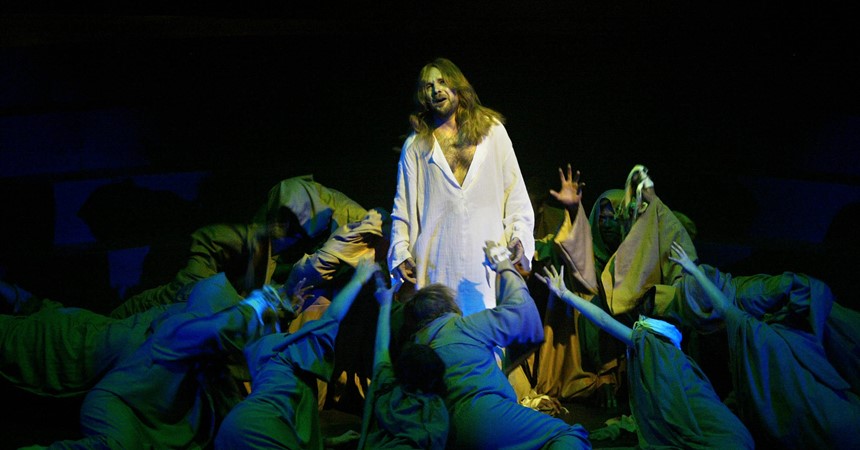In writing the plot and the lyrics, Tim Rice must have gone through a process of deciding what he believed and wanted to convey, what he thought would be acceptable and appeal to the audience he had in mind, perhaps even what he thought he could and could not get away with.
From the success of the staged versions, the movie, and the recordings, it is evident that he triumphed in terms of popularity and earnings.
As a product of its writer and its times we encounter, no doubt, the reason for there being no Superstar resurrection. Resurrection was a step too far.
Resurrection would have propelled the superstar into an entirely different orbit, into God, into a religious entity unacceptable or foreign to many venturing to London’s West End or New York’s Broadway. Best not to go there.
For talk of resurrection, some of those theatre-goers would have gone to church. For entertainment, and some intellectual stimulation, the theatre provided well for the masses.
Theatre audiences left with Andrew Lloyd Webber’s great music playing in their heads. They also left with challenges and stimulating ideas and questions about Jesus. They would not have felt Rice was preaching at them. They would have left with no sense of definitiveness and firm conclusion. Many would blithely have repeated Mary Magdalene’s lyrics, “He’s a man, he’s just a man”.
They lived through, for a few hours, a psychological tussle between two protagonists, Jesus and Judas, and within each of these highly imagined characters as well. Some would have identified this same contest within themselves. Mary Magdalene and Pilate are also portrayed in terms of imagined inner struggle. We are drawn to sympathise with their difficulties, both internally and in the public forum.
Biblical incidents from Jesus’ last week are there, picked and chosen. Some are fabricated, some omitted. Rather than an accurate theological or historical presentation, Superstar is heavily psychological, and therefore imaginative or projective in nature. This preoccupation makes it consciously anachronistic. No one should attend Superstar as their prime catechetical experience.
The big ending – Resurrection – is not there for Rice or the contemporary audience. It was not there for the Sadducees in Jesus’ time, either. Unlike the Pharisees, their convictions did not extend to life after death. Jesus told them it should, if their ‘superstars’, Abraham, Isaac, Jacob and Moses, were ultimately to have meaning and value.
Saint Paul writes similarly, to the Christians at Corinth and to us. No resurrection for Jesus, none for us! We are to be greatly pitied if, in fact, there is no resurrection as we believe.
The film version of Superstar ends with an allusion to resurrection for those who want to see it. A shepherd is seen leading sheep in the shadow of the empty cross. ‘Take from that what you will’, it seems to suggest.
What does Superstar leave its audience? As mentioned above, great music, psychological drama and serious issues of human behaviour to ponder are all legacies. For the believer and the non-believer alike, there are images of characters battling with questions of doubt, duty, destiny, altruism, fatalism, commitment, self-image, self-deception, rationalisation and other such struggles of the human condition.
Concerning the Superstar, the non-believer may conclude, “Good person, done in as always.” Or possibly, “Should have been a bit more clever and self-preserving than that! Should have looked after number one.” Perhaps even, “A true humanist, rightly immortalised in human history for his integrity and futile struggle against the odds.”
As I see it, for the human spirit with its infinite longings, the “immortality” that comes only from being well remembered isn’t eternal, not nearly enough. Even a Superstar whose only immortality is in other mortal memories is no more a lasting star than those ordinary mortals remembering him until they burn out. Besides, being well-remembered means nothing at all to the very one who is remembered but no longer exists to appreciate being remembered. It has to be personal immortality – eternal life – or nothing!
The disciple of Christ, likewise emerging from the theatre with the exuberance of a powerful dramatic experience, will be grateful for the faith that says this was no struggle without triumph, no gloomy night without sunrise, no death without resurrection.
The disciple’s response: “Thanks be to God for the Superstar who was raised up, drawing all of us to be rising stars.”
Enjoy “Superstar” for what it is – brilliant musical theatre about a good man!
Take it further in your heart, beyond the theatre, to our Resurrection with the God-man.




























































































